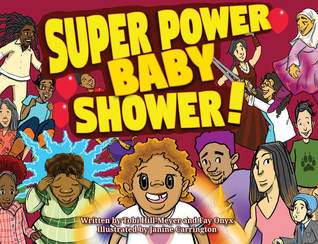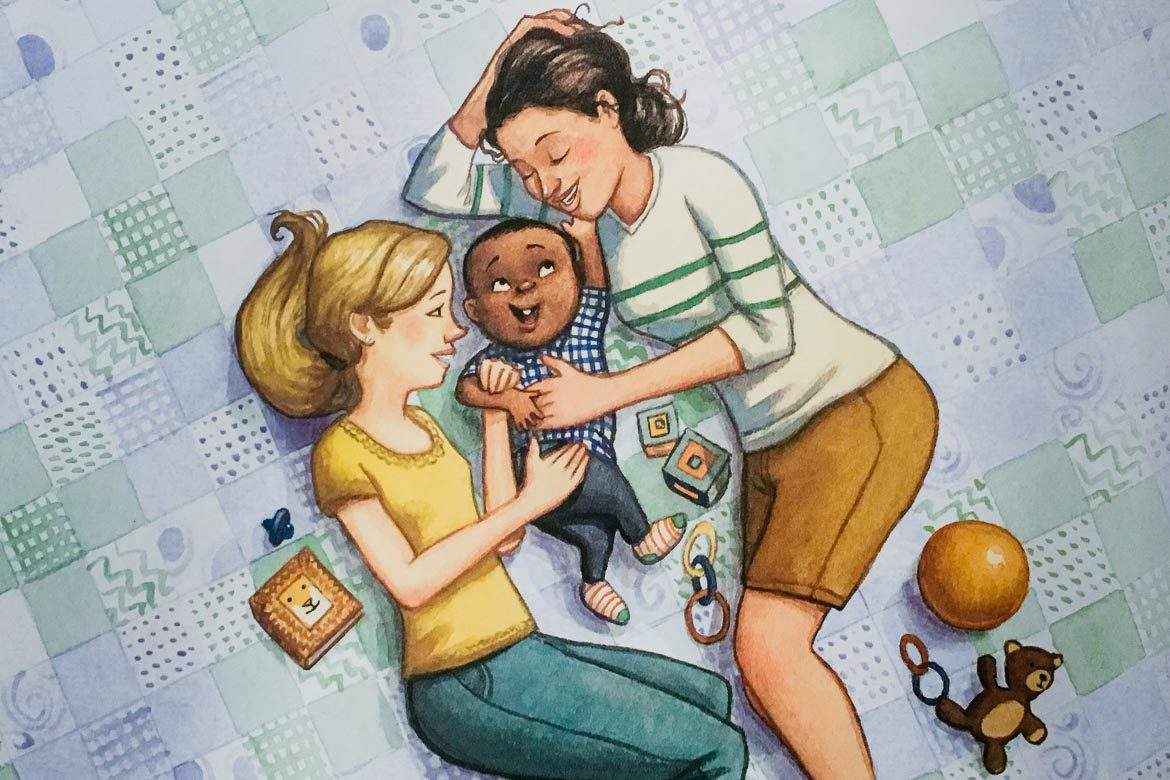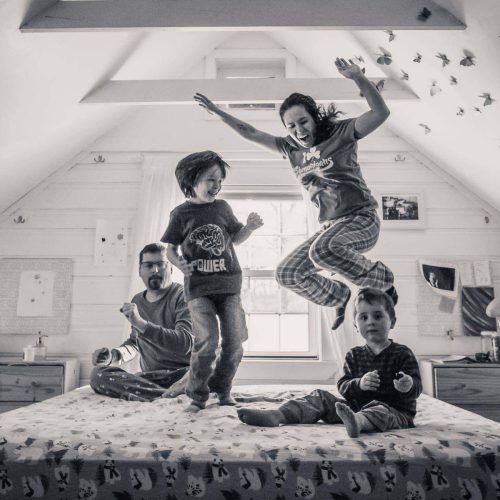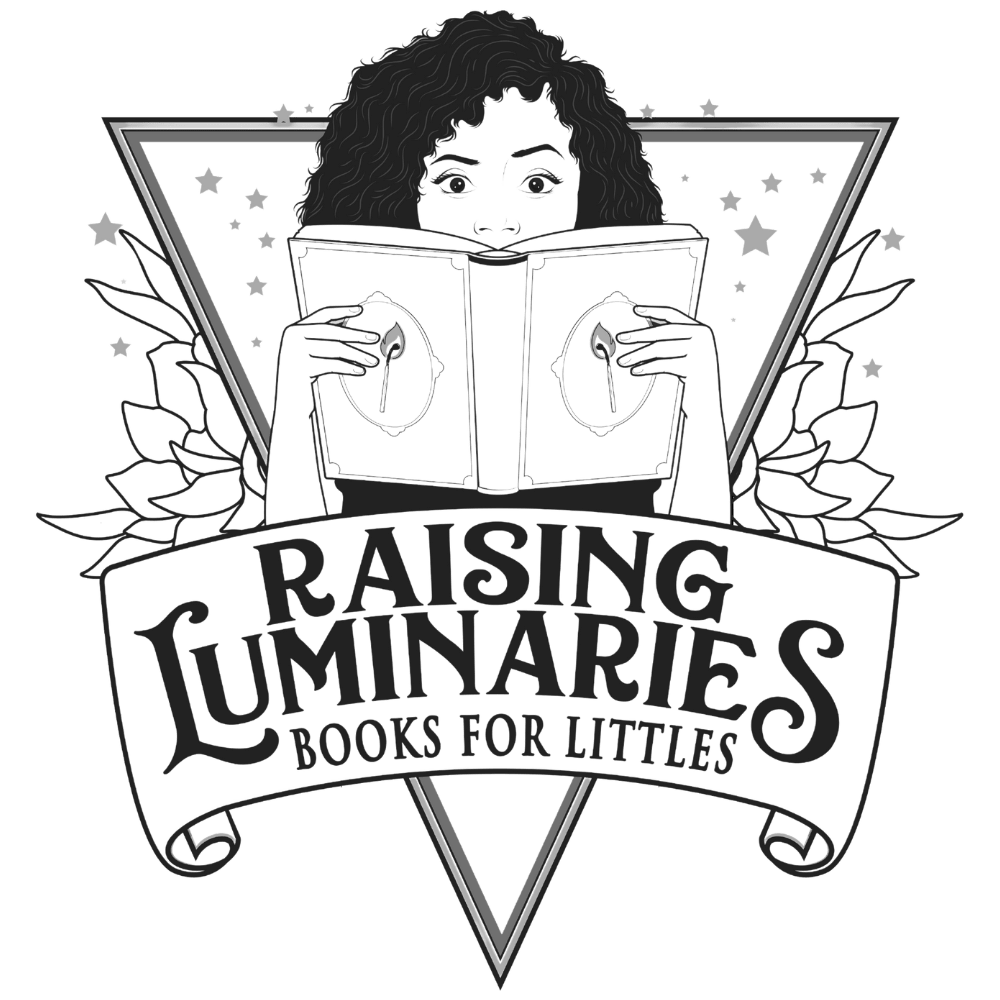[Image description: A multiracial & transracial family of three with two-mothers and their infant cuddle and play on a picnic blanket. From an interior page from Littles And How They Grow, by Kelly DiPucchio & AG Ford.]
Raising Luminaries is free and accessible for readers who can’t afford a paywall. Posts may contain affiliate links, which allow me to earn a commission at no extra cost to you. Check out the full affiliate disclosure along with my statement of accountability. If you’re into supporting libraries (please do!) more than consumerism, you can also support my work directly:
Donate or shop using an affiliate link via| Paypal | Venmo | Ko-fi | Buy a t-shirt | Buy a book
All Families Are Real Families
When I moved to a suburb full of wealthy, white, conservative nuclear families as a kid, the school administration was so concerned for my psyche, they pulled me out of class for weekly group therapy with the other three single-parent kids and suggested my mom send me to private therapy.
I wasn’t exactly reeling from growing up in a single-parent household – it was all I had ever known.
And this is how, from the very start, we systemically stigmatize of non-nuclear & non-heteronormative families.
We need more books with accurate representation of diverse family constellations. Kids don’t become criminals and ne’er-do-wells because they don’t have exactly 2.0 biologically-related cishet color-matched parents, 1.5 siblings and a dog named Spot.
Nuclear Family Supremacy! LET’S SMASH IT.
A Quick Guide to book types:
- Validating books help kids with similar experiences know they aren’t alone. They might be problematic (reinforcing stereotypes, etc). with the wrong readers, so please use them cautiously.
- Destigmatizing books help kids of privilege empathize with under-represented identities and experiences.
- Normalizing books show all kids that we have more in common that not – everyone belongs and has a right to be represented without being tokenized.
ACCESSIBILITY: Images in this post are covers from the books mentioned in accompanying text. Captions feature the age when my kids ‘got’ the story.
*FTC DISCLOSURE: The publisher of The Zero Dads Club, and Super Power Baby Shower, Flamingo Rampant, sent me free digital review copies of their books so I could check them out. Flamingo Rampant is not a sponsor of BFL at this time and I wasn’t paid to include any of the books listed here. This post and Books for Littles is actually brought to you by awesome, kind, and generous readers like you.
The Best Family Constellation Books
A Family is a Family is a Family was* my super-duper favorite-est book representing all kinds of families – including same-sex parents, multiracial families, large families, single-parents, shared-custody, blended families, disabled parents, and grandparents as primary caretakers.
*Update: See the comments below, where TJ noticed a scene in this book that is problematic for objectifying adopted children.
The reason this one had bubbled up to my top-most favorite is the way it smacks down condescension against foster-families. Foster kids are often left out of these books, or they’re an afterthought because…some people don’t count them as families. GRRR.
ALL families are real. A family is a family is a family, just like Love is love is love is love.
*The Zero Dads Club is a validating book for kids with single parents, nonbinary parents, trans moms, lesbian moms, adoptive parents, and kids raised by extended family. The writing is a bit clunky, there’s not much of a story, and it’s a little ableist (‘dumb’ is used as a pejorative, and the makers include a physically disabled character that plays into shy/helpless stereotypes).
But I’m glad it exists, since it includes LGBTQ+ constellations I haven’t seen anywhere else.
Adoptive & Transracial Families
For more resources on solidarity and support adopted kids in our community, check out:
- The Reality of Being Adopted: Validating Stories For Adopted Kids
- Find more recommended Adoption Family Constellation stories in our Bookshop store.
- Validating Stories For Adopted Children Who Have Experienced Trauma (rough booklist)
- Identifying problematic adoption tropes in kidlit (rough booklist)
- Anti-fairytale stories about adoption & foster families (rough booklist)
- Video series: Unpacking problematic adoption tropes in kidlit: Part 1, part 2, part 3, part 4, part 5, part 6, and bonus video. (I’m long-winded!)
- Stories for kids with incarcerated family members (rough booklist)
Pictured below:
- My New Mom & Me (validating)
- Real Sisters Pretend (validating, destigmatizing)
- All Together Now (validating, destigmatizing)
- And Tango Makes Three (destigmatizing)
- How Nivi Got Her Names (open adoption, normalizing)
- Something Good (normalizing)
![]()
Foster Families
For more resources on solidarity and support kids in the foster system, check out:
- Find more recommended Foster Family Constellations in our Bookshop store.
- Validating Stories For Adopted Children Who Have Experienced Trauma (rough booklist)
- Identifying problematic adoption tropes in kidlit (rough booklist)
- Anti-fairytale stories about adoption & foster families (rough booklist)
- Stories for kids with incarcerated family members (rough booklist)
Pictured below:
- Duck (validating for parents)
- Pup and Bear (destigmatizing)
- Recommended with caution: A Family is A Family is A Family (validating for kids, destigmatizing): see comments below on how possible adoption scene could be objectifying.)
Single-Mothers
For more resources on solidarity and support for single mothers in our community, check out
- Toolkit: Single Parenting in a Post-Apocalyptic Hellscape with Revolutionary Humans
- All The Single Mamas – Triumphant Stories Appreciating Single Mothers
- Find more recommended Single Parent Family Constellations in our Bookshop store
- Stories for kids with incarcerated family members (rough booklist)
Pictured below:
- Away (validating, normalizing)
- What’s My Superpower? (normalizing)
- How Mamas Love Their Babies (destigmatizing).
Single Fathers
For more resources on solidarity and support for single fathers in our community, check out:
- Raising Tomorrow’s Fathers: Kids Books with Feminist Dads
- Toolkit: Single Parenting in a Post-Apocalyptic Hellscape with Revolutionary Humans
- Find more recommended Single Parent Family Constellations in our Bookshop store
- Stories for kids with incarcerated family members (rough booklist)
Pictured below:
- Enemy Pie (normalizing)
- Hush a Bye, Baby (normalizing)
- Dad by My Side (validating, destigmatizing)
Trans, Nonbinary & Gender-Fluid Parents
For more resources on solidarity and support for trans, nonbinary & genderfluid caregivers:
- Beyond the Binary: Why we Need Gender Creative Characters in Kidlit
- Queer Rainbow Children’s Books by Indigenous, Black & Brown Authors
Pictured below:
- My Maddy (destigmatizing, nonbinary single parent)
- Rachel’s Christmas Boat (destigmatizing, normalizing, trans dad) – No longer recommended, read the update here.
Check out: Raising Tomorrow’s Fathers – Books Featuring Loving Dads
Two-Dad Families
Harriet Gets Carried Away (normalizing), Stella Brings The Family (validating, destigmatizing), One Dad, Two Dads, Brown Dads, Blue Dads (destigmatizing)
Two-Mom Families
A Flock of Shoes (normalizing), Heather Has Two Mommies (destigmatizing, validating), In Our Mother’s House (validating)
Same-Sex Parents – Compilations
Blanket of Love (normalizing), Everywhere Babies (normalizing), Littles And How They Grow (normalizing)
Interracial Families & Multiracial Kids
These days most of my kids’ friends are mixed-race. Yet, after 30+ years of strangers asking me ‘So, what ARE you?‘ and facing racism from both whites and Asians who’d prefer the races not mix, I’d like to remind everyone not to get complacent. This fight isn’t over.
For more resources on solidarity and support multiracial kids, check out:
- Microaggressions Against Multiracial Kids – Books Where Kids Can Belong
- Find more recommended Kids Books Featuring Interracial Families & Multiracial Kids in our Bookshop store
Pictured below:
- My Two Grannies (validating)
- All The World (normalizing)
- Spork (validating, destigmatizing)
Check out: Justifying Our Existence – Stories Featuring Multiracial Families
Polya/Polyam Families
Izzy’s Sick Day (normalizing), Raf And The Robots (normalizing, but ambiguous), *Super Power Baby Shower (normalizing), Love, Z (normalizing, but ambiguous), The Phantom Unicorn (validating, but ambiguous)

Ages 5+
![]()
Extended Family Guardians
Books that include grandparents, aunts, and uncles as caretakers.
Dear Baobab (aunt and uncle, validating), One Family (grandparent, normalizing), Two Is Enough (grandmother, validating), Polka Dot Fixes Kindergarten (grandfather, normalizing), Those Shoes (grandmother, normalizing), Julián Is A Mermaid* (grandmother/abuela, normalizing), Akilak’s Adventure (grandmother, normalizing, mentions death of parents).
It’s worth mentioning that while this book is super sweet and affirming, there are some issues with how Love, a white allocishet author appropriated and whitewashed the experience of a Dominican child of color.
![]()
![]()
Blended Families – Divorce/Co-Parenting & Shared Custody
I Have Two Homes (validating, during & after divorce), Living With Mom And Living With Dad (destigmatizing, validating, post-divorce), The Mirror In Mommy’s House / The Mirror In Daddy’s House (destigmatizing, validating, post-divorce), Fred Stays With Me (validating, post-divorce, but with a dog welcome in both homes.)
All of these books are heteronormative for middle/upper-income families, with both parents sharing custody. As I find stories with more diverse representation, I’ll add them to our Shared Custody & Blended Family Constellation Bookshop store.
![]()
Blended Families – Step-Parents
The Memory String (validating, step-mother), Boundless Grace (validating, destigmatizing, step-mother & siblings*), When Otis Courted Mama (validating, mom’s boyfriend), The Day Santa Stopped Believing In Harold (normalizing, with a white-presenting son and mother and Black step-father referred to as ‘dad.’)
![]()
Blended Families – Siblings
Sam Is My Half-Brother* (validating, sibling rivalry), When I Am A Sister (validating, new baby)
*Check out JF’s discussion on why we try to avoid using the phrase ‘half-siblings’ in the comments section below. It’s wonderful.
Stay Curious, Stand Brave & Speak Up
I’m multiracial, autistic & co-parenting my biologically-related kids with a partner. I was raised by a white single mother, have three step-siblings, and two adopted brothers. I am not adopted, don’t know what it’s like to be raised by same-sex parents or two parents, etc. and make mistakes. So if I’ve missed anything problematic in the above books, leave a comment so we can all learn.
It’s taken me over seven years to research, vet, and regularly update this collection. If you found it helpful, support this work to help more families benefit from this work.
Support these resources via Paypal | Venmo | Ko-fi | Buy a t-shirt | Buy a book























































8 comments
Have you read Home at Last by Vera B. Williams? It’s about a boy who is adopted from foster care by a male couple. It’s one of the few picture books that I’ve seen address lingering trauma that doesn’t magically go away when a child is adopted. But I don’t really know enough about trauma or adoption to know if the book does a good job or not. I’d be interested in hearing your thoughts.
That’s a good point – that story doesn’t try to erase the hard origin and continued trauma of adoption. Honestly though – the way the story is put together felt so clunky and weird. I can’t speak as an adopted person, but just from a perspective of it being a book for children, to me it felt jumbled together and poorly executed, so the attempt at validating pain kind of got lost somewhere in there.
I picked up “A Family is A Family is A Family” and it was great except for the pages about adoption – the image of a mail-order baby was pretty dehumanizing to me, particularly as a transracial adoptee who was essentially “shipped” the US. It is also odd since none of the other examples in the book are so exaggerated. I want to use it in my classroom, but if I remove those pages, I remove adoption from the story, and that’s definitely not what I want to do. Hoping something better comes around soon.
Ohhh no! I’m so sorry. It never occurred to me that this scene was an adoption – I interpreted it as a child whose parent hadn’t told them about how babies are born. Which of course, is me centering biological siblings as the norm, and isn’t okay. Given the narrative of transnational adoption, particularly as told by a non-adopted sibling, that scene is definitely problematic.
Thank you for pointing this out. I will add a note to this collection and other places I’ve discussed it.
I’m SO happy to see Everywhere Babies here. I bought that book on a whim when my 12 year old was a baby, and I have always been so thrilled by how it normalizes so many things: same sex families, breastfeeding AND bottle feeding, strollers AND carriers, etc.
I want to point out one thing: as the mother of “half” siblings, I really, really detest this term. I birthed three children–two from one father, and the third from another father. My son is not the “half-brother” of my daughters. He is their brother. Full stop. I find that this term helps insert a division between the children and, frankly, it’s not something we encourage in other family arrangements. You see a lot of writing, for example, about how it’s not appropriate to refer to someone’s adopted child as “your adopted son”–he’s their son. That’s it. I don’t know if there is a big debate about the “half” term because my youngest (from the second father) is only a year old and I have literally not had a moment to even research this, but I wanted to point it out because I thought you would find it relevant.
PS Love your work!!
JF – This is spectacular, thank you! I’ll update the language in the post – you make such a good point <3
Oh, thank you so much for responding and for changing it! I’m glad to hear that you think it’s a valid thought and not just an over-reaction. It’s something I feel very strongly about.
I’m always grateful for insight like this – thanks for taking the time to point this out! Challenging someone’s language is often scary and it takes a good deal of courage. I’m grateful <3